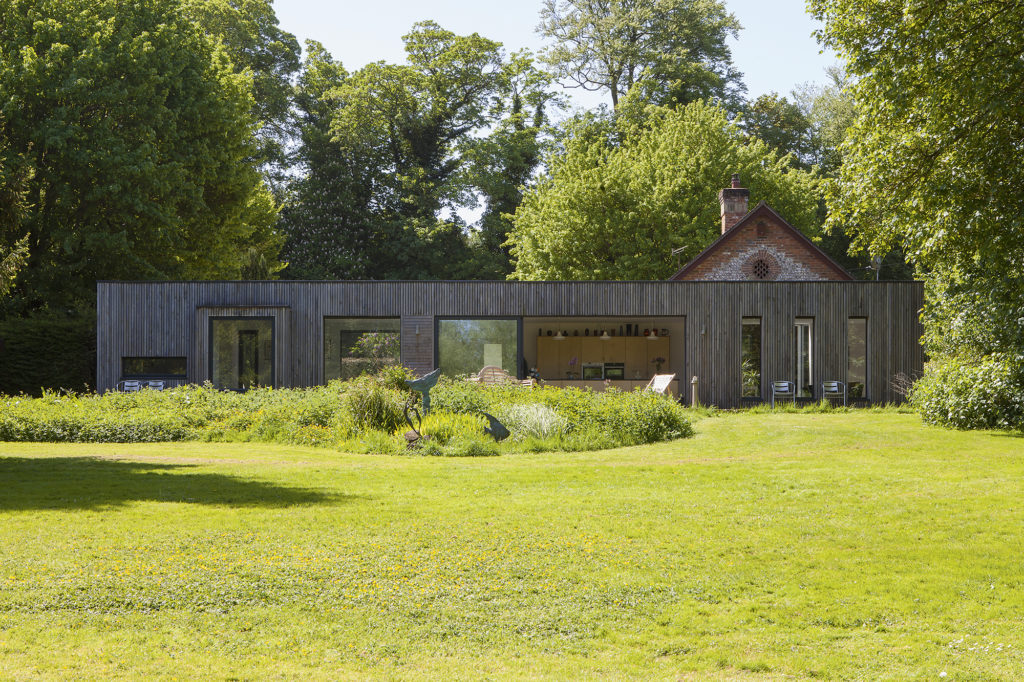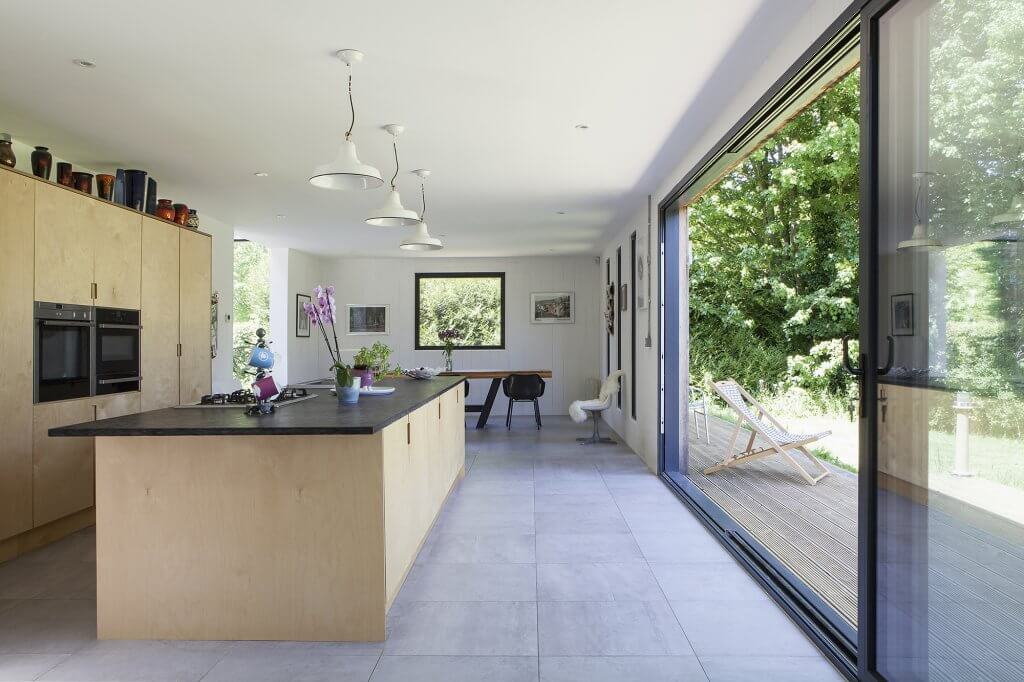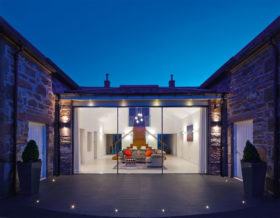
Learn from the experts with our online training course!
Use the code BUILD for 20% off
Learn from the experts with our online training course!
Use the code BUILD for 20% offEver since they got married, Jonathan and Zahra Chambers had always lived in new build homes. However, the couple had become frustrated by the lack of outdoor space and close proximity to neighbours that’s a common feature of many developer-built dwellings.
So they decided to begin their hunt for an abode that was totally different. “We were looking for a property that was the complete opposite to the house we were living in at the time,” says Jonathan. “We wanted more privacy, as well as space for parking and entertaining guests.”
The couple were after a family-orientated property where they and their 10-year-old daughter could live for many years to come. “People talk about their forever home, and we knew it would just be one last leap until we managed to discover ours,” says Zahra.
The couple focused their search on several picturesque villages in Hampshire, not too far from where they were living, and waded through sales particulars.
However, it was while Jonathan was driving to work one day that he spotted a for sale sign outside a listed barn conversion, in a small Georgian town near Winchester.
“We’d only been looking around seriously for about a year at that point, and this particular area hadn’t been on our shortlist. I hadn’t thought there would be anything suitable for us that was within our price range,” he says.
“It was one of those really fortuitous moments that I happened to be passing by and spot something that was just right for us. Plus, we were in a good position because our home was on the market and we already had a buyer, so were able to act quickly.”
When Zahra saw the barn, it was love at first sight. “It’s a beautiful and unusual building,” she says. Set within a large, leafy plot, the property seemed ripe for an extension of some sort. However, even before the couple purchased the site, the estate agents warned them that they would be unlikely to get planning consent to construct an addition.
“They said they hoped we weren’t buying it purely with the view of doing a project. Actually, we weren’t – it was just for the plot size and privacy, and to have something that was very different to what we had always lived in previously.”

The couple choose to clad their modern extension with English oak, supplied by Vastern Timber, which ages beautifully
The barn has an interesting history, too. Constructed in 1864, it’s one of the last remaining buildings that associates the town with the sheep industry. “The old agricultural fairs were essentially held in what’s now our back garden,” says Jonathan.
The structure was originally converted to residential accommodation in the early 1980s, and the Chambers are only the second family to live here. “The people who were here before obviously did something radical, in that they took this barn and made it into a home. We’ve continued the theme by adding a contemporary extension,” says Zahra.
After purchasing the barn in 2013, the family decided to live there for a few years to work out what kind of alterations would best suit their lifestyle. This time window also allowed them to save enough money to tackle a sizeable project.
“Our hope at that stage was to do everything on a budget of £150,000. Once things got moving, it quickly became clear that we’d need more,” says Jonathan.
With a provisional idea to convert their 1980s double garage into living accommodation and connect it to the main house, Jonathan and Zahra began their search for an architect. Whilst he was flicking through a homes magazine, a contemporary timber-clad pool house caught Jonathan’s eye.
After some investigation online, it turned out that the project was situated in a village just 10 miles down the road and had been designed by the Winchester-based architect, Adam Knibb of Adam Knibb Architects. “I really liked it and I thought that the style could work well for our scheme. We arranged to go and look at the pool house, and it all tied together,” says Jonathan.
The Chambers liked Adam Knibb from the first meeting. “We were keen on his ideas and he had form with the planners as well,” says Zahra. “He told us about other projects he’d worked on, where he’d been able to achieve consent, so we felt that if anyone was going to be able to take our scheme forward it would be him.”

Instead of plastering the walls, the couple left the CLT panels exposed, white-washing them for texture and character – and as a reminder of how their extension came together
Adam came up with three design proposals, but after preliminary discussions with the planners, events took an interesting turn. “The council came up with the idea of knocking down the garage and building a contemporary extension in its place, connected to the house via a large glass link,” says Jonathan. “They didn’t want another brick and flint pastiche of the original barn.”
As the Chambers are fans of the full range of modern and traditional architecture, they were delighted to pursue this course of action. “It was a chance to indulge and have a bit of both – that’s not an opportunity you get very often!” says Zahra.
Based on his discussions with the planners, Adam came up with a striking contemporary design inspired largely by the pool house that Jonathan had originally seen in the magazine. The structure would be built using a cross laminated timber (CLT) system, with plenty of glazing to enhance the modern feel.
As one of the couple’s key goals was to make the most of the fantastic garden views, the extension was orientated perpendicular to the main house, establishing an L-shaped footprint. The two parts of the dwelling would be connected by a glazed link, which would also serve to delineate the original part of the property from the new addition.
Once the application was submitted, it sailed through planning. “You often hear quite poor stories about planners, but to be fair to them, they stuck to their word,” says Zahra. “We were quite amazed at how easily it all went through, particularly as the barn is listed, which tends to make things trickier.”
After sourcing quotes from five or six builders, Jonathan and Zahra opted to go with the contractor who had worked on the pool house that was so similar to their own proposed extension.
“Because we were using a contemporary build system, that somewhat limited our options – I think some of the firms we reached out to were a little scared by it, actually,” says Jonathan. “However, because our chosen professional, Greg, had worked with CLT before, we felt confident that he knew what needed to be done.”
While Greg handled the bulk of the project management duties, Jonathan was on site every day to help out and answer questions when needed. “It was a shared responsibility in a strange way, but Greg did the lion’s share. My role was more that I did a lot of research with Adam on what suppliers we were going to use for the CLT structure, cladding, sliding doors and so on,” says Jonathan.
In the end, the couple sourced their timber frame from the same company who had provided the skeleton for the pool house; specialist Austrian supplier KLH. Zahra remembers the moment the kit was delivered as one of the high points of the build.
“It was a beautiful winter’s day with a bright blue sky,” she says. “Just seeing this enormous crane and then these gargantuan pieces of wood coming in was amazing. All of a sudden, you had a real structure – it was certainly a standout part of the project.”
As well as the speed of construction – the frame was erected in three days – the couple were also drawn to this build method due to its impressive eco credentials. “The system creates a thermally-efficient shell, so you’re losing very little heat. We’ve complemented this by installing triple-glazed windows, too,” says Zahra.
Jonathan was particularly impressed with the highly accurate, computer-controlled manufacturing process. “It’s all machine engineered in a factory in Austria. It’s a high precision way to build, so when it came to fitting the glass everything slotted into place perfectly. We didn’t have any problems at all – it worked really well.”
The extension has been clad in English oak boards sourced from Vastern Timber. The couple knew that the timber would weather to a beautiful silver colour over time, helping the building to blend seamlessly into the wooded setting.
“The finish has worked really well. Possibly our next step will be to put in a few trees to make the addition fit with the landscape even more,” says Jonathan.
The couple agree that the completion of the glass link was another high point of the build – although they admit that watching the structure get craned in over the original house was somewhat nerve-wracking.
“It was such a big achievement when we finally connected the two buildings,” says Jonathan. “We had lost our view from the bay window in the barn towards the end, because that needed to be removed to make way for the link.”
As the extension forms such a contemporary-looking addition to the original barn from the exterior, the Chambers were keen to continue this theme inside. The structure houses an open-plan kitchen-diner, plus a casual seating area that’s delineated by a partial wall.
There’s also a bathroom and a utility zone. All the bedrooms and a formal lounge area are situated in the original dwelling. Underfloor heating has been laid throughout the extension. The couple have opted for a minimal Scandinavian decor theme, complete with a bespoke handmade kitchen and grey ceramic floor tiles.
Rather than have the walls plastered, the CLT panels have been sanded and white-washed to create a characterful, textured look. “We had a couple of offcuts left over, which we’ve made into a large dining table and a small coffee table,” says Jonathan.
“It’s nice to have a reminder of what the extension is actually made from. Plus, the texture on the walls makes the whole space feel bright and unique.”
Now the extension is complete, the Chambers have no regrets about having tackled such an ambitious project. “Although the barn is a nice size, it’s built in a very ’80s style in terms of having a floor plan divided up into lots of little rooms,” says Jonathan. “So it’s nice to have such a large open-plan area in the extension.”
The couple love being able to make the most of the far-reaching garden views, too. “When I’m standing in the kitchen washing up, I’m able to see right down the garden to look at all the wildlife and trees,” says Zahra. “It’s quite amazing.”
Despite toying with the idea of creating a car barn or converting the loft at some point in the future, the Chambers have no plans to take on another big project any time soon. In that sense, they have achieved their goal of creating a forever home for their family.
